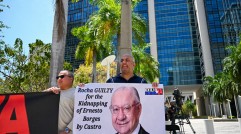Young Hispanics Sparking Rise in English Proficiency Among Latinos, Says Pew Research Study
A Pew Research study finds a steady of influx of young Hispanics being born in the U.S. sparked a surge in English proficiency among Latinos over the last decade plus.
Researchers gleamed much of their information from analyzing U.S. Census Bureau data, which found as recently as two years ago 88 percent of Latinos between the ages of five to 17 insisted they only speak English at home or speak it "very well," an uptick of 15 percent from the start of the new millennium.
More Hispanics Now Born in U.S.
In addition, a 76 percent share of Latinos between the ages of 18 to 33 also insisted they speak English "very well," an increase of 17 percent over the same time frame.
Researchers found at the root of all the changing dynamics was a change in demographics. More specifically, data shows more Hispanics are now born in the U.S. than the number of those still arriving here as immigrants.
In 2014, 65 percent of all Latinos here were U.S. born, compared to just 60 percent in 2000. That change has resulted in more young Hispanics growing up in households were only English is spoken (37 percent to 30 percent) over that 14-year period beginning in 2000.
At the same time, researchers also found many Latinos are somehow managing to hold on to their roots, with nearly 37 million of them still speaking Spanish at home, paving the way for the language to be the most spoken non-English language in the U.S.
Latinos Still Value Ability to Speak Spanish
Data also shows Latinos maintain they still value the ability to communicate using Spanish, with 95 percent insisting that future generations of U.S. Latinos continue to speak the language.
Overall, however, nearly three in four Latinos, or 71 percent, insist speaking Spanish is not required to be considered Latino.
Subscribe to Latin Post!
Sign up for our free newsletter for the Latest coverage!
* This is a contributed article and this content does not necessarily represent the views of latinpost.com














